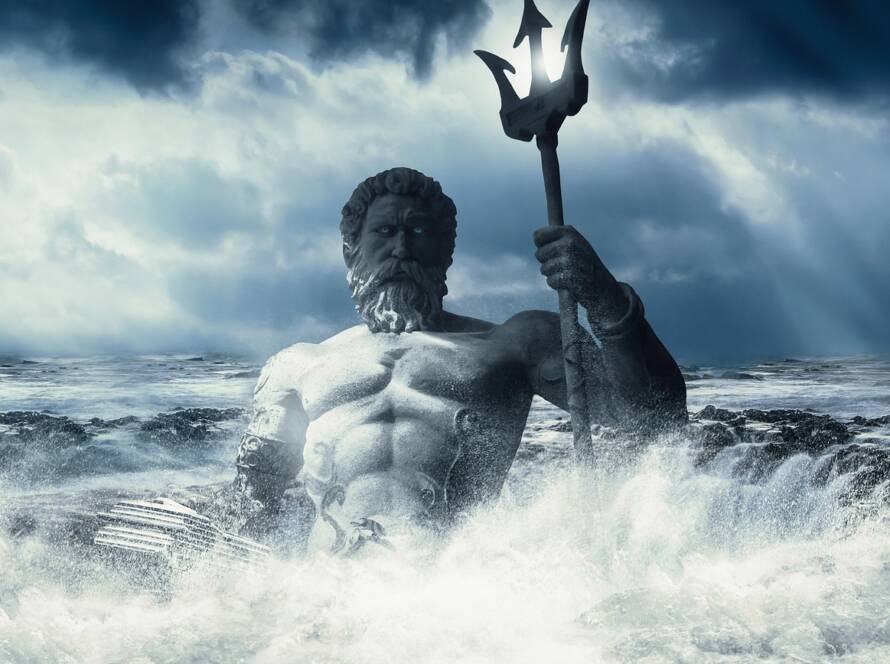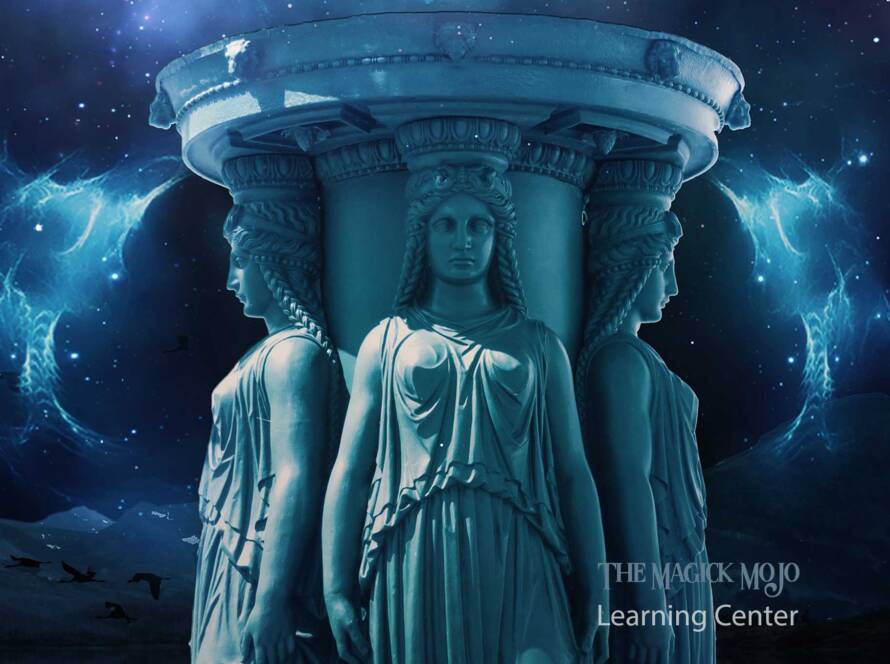As the thunderous ruler of the Greek pantheon, Zeus has captivated human imagination for millennia. Ascribed with the control of the skies, weather, and law and order, he was revered as the King of the Gods and the father of men. His mythical narratives, filled with epic battles, divine trickery, and human-like flaws, etched a captivating image in the minds of the ancient Greeks. This image, however, did not fade with the fall of their civilization. Instead, Zeus’s symbolism has been resilient, becoming a pivotal figure in the modern occult world.
In the present day, occult practitioners often draw on the symbols and deities of ancient cultures to enhance their spiritual practices. The symbolism of Zeus, embodying authority, power, and justice, finds a prominent place in these practices. His energy serves as a potent tool in rituals and magic aimed at gaining strength, asserting leadership, or seeking fair outcomes.
Moreover, the shift in Zeus’s perception from a literal deity to a symbolic entity reveals much about the evolution of religious thought. As we’ve moved into the modern era, the focus has transitioned from external worship to internal exploration, making the ancient symbols a bridge to the higher self. In this context, Zeus stands as a vibrant testament to humanity’s timeless quest for understanding the divine within and beyond us. Today, he continues his reign, not atop Mount Olympus, but in the minds and rituals of those in the modern occult world.
- Table of Contents
- Zeus: The Sky God of Ancient Greece
- Zeus’ Symbols and Their Meanings
- Zeus in Modern Occult Practices
- Zeus in Pop Culture and Contemporary Thought
- Personal Experiences and Anecdotes
- Cautionary Notes: Ethics and Appropriation
- How to Begin Working with Zeus
- Further Exploration: Enlightening Materials on Zeus and Modern Occultism
Zeus: The Sky God of Ancient Greece
Zeus, reigning as the sky god and chief deity of ancient Greece, holds an extraordinary place in classical mythology. Rooted in his omnipotent character, he became an influential figure in religious, cultural, and social contexts. From the towering peak of Mount Olympus, he wielded his unyielding authority over the divine and mortal realms, ruling with his mighty thunderbolt in hand.
An in-depth exploration of his mythos reveals a rich tapestry of tales intertwined with power, conflict, and paradox. Notoriously known for his numerous romantic escapades, he fathered an array of gods, demigods, and heroic mortals, each contributing to the vast narrative of Greek mythology. Whether through his fearsome wrath or paternal guidance, Zeus embodied the intricate facets of life, reflecting the ebbs and flows of human nature.
Transitioning from myth to actual practice, the worship of Zeus pervaded ancient Greek society. His temples and statues stood as colossal reminders of his divine supremacy. His influence permeated Greek life, marking significant events from the familial household to the athletic games that honored him. The omnipresent influence of Zeus embedded him deeply into the cultural fabric, reinforcing his status as a supreme deity.
Zeus’ Symbols and Their Meanings
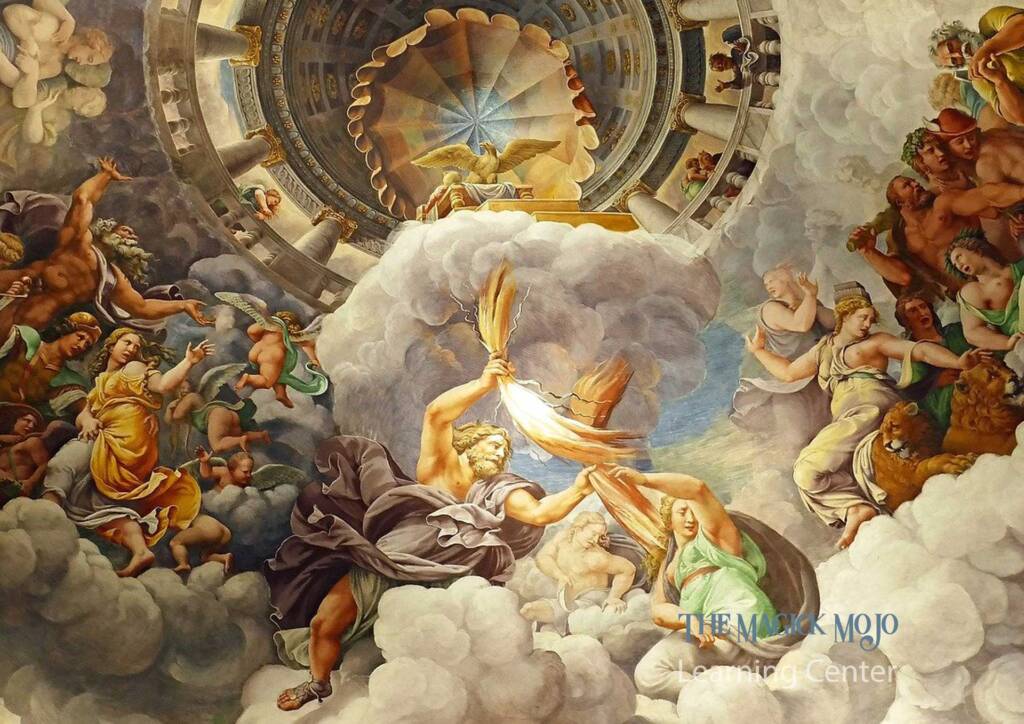
Zeus, the almighty ruler of the Greek gods, is often associated with an array of potent symbols, each reflecting facets of his divine power and persona. The eagle, his most iconic representation, signifies keen vision, sovereignty, and transcendence. Today, in the realm of modern occult practices, the eagle embodies spiritual insight, leadership, and an elevated consciousness – aligning well with Zeus’ reputation as the overseer of the cosmos.
Moreover, Zeus’ thunderbolt is another symbol synonymous with his formidable presence. This emblem of his celestial might and authority suggests a sudden, transformative force or enlightenment in the occult world. Practitioners often associate it with profound spiritual revelations or upheavals. Likewise, the scepter, a symbol of Zeus’ kingship, is presently seen as a tool signifying authority, wisdom, and command over life’s circumstances.
The Aegis, a goat-skin shield, further reinforces Zeus’ protective and powerful role. This mystical armor was believed to instill dread and awe in the heart of adversaries, echoing his omnipotent reach. Within modern occult traditions, the Aegis can symbolize spiritual protection, divine guidance, and resilience, echoing its ancient connotations. Thus, through these symbolic associations, the dynamic persona of Zeus continues to hold sway in contemporary esoteric interpretations.
Zeus in Modern Occult Practices
In the modern occult world, Zeus continues to command awe and respect, embodying a wealth of symbolic meanings. Practitioners often invoke his mighty persona as an epitome of power, wisdom, and divine authority, channeling these energies in their rituals and personal development. Just as Zeus reigned over the ancient Greek pantheon, he is perceived today as a potent symbol of leadership and the ability to govern one’s life effectively.
Additionally, his role in occult practices often revolves around transformative processes. His thunderbolt, a symbol of sudden, enlightening change, is especially significant in this regard. Practitioners might call upon Zeus when seeking clarity or a breakthrough in their spiritual journey. His dynamic energy and connection to the celestial realms can provide a catalyst for profound personal revelations and growth.
Furthermore, contemporary occult practices place great emphasis on the individual’s relationship with divine entities. In this context, practitioners may forge a personal connection with Zeus, building an understanding and communion that resonates with their spiritual path. Through meditation, visualization, and other esoteric techniques, they cultivate a unique, personal relationship with this ancient deity, tapping into his timeless wisdom and influence. This deep, spiritual engagement with Zeus helps to breathe new life into his ancient mythos, ensuring his continued relevance in the modern occult landscape.
Pop Culture and Contemporary Thought
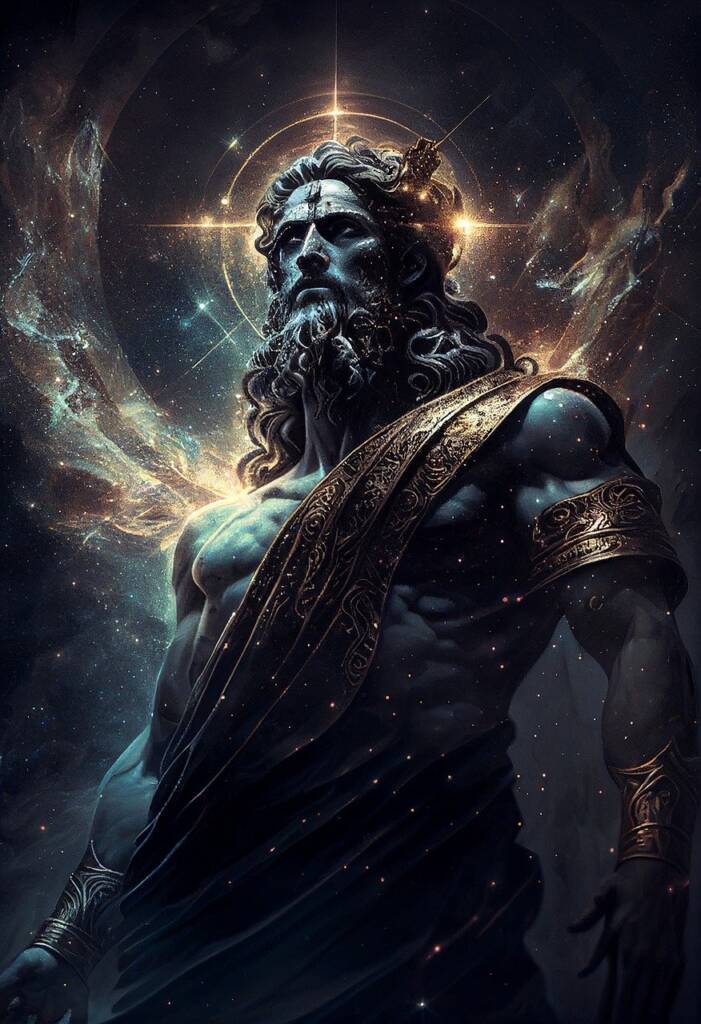
In popular culture, Zeus often stands as a widely recognizable and influential symbol, transcending his mythological origins to infiltrate various aspects of contemporary thought and entertainment. Cinematic and literary representations of this thunder-wielding god underscore his attributes of leadership, authority, and dynamism. From blockbuster movies to widely-read novels, his image often serves as a familiar touchstone, sparking public interest and curiosity in ancient Greek mythology.
Interestingly, these portrayals in modern pop culture often explore the god’s more human-like qualities. In some stories, he is seen struggling with the same moral quandaries and personal dilemmas that humans face. This relatable depiction of Zeus allows audiences to connect more deeply with him, fostering a nuanced understanding that goes beyond his traditional image as an omnipotent deity. These personal narratives also create an opportunity for audience members to reflect on their own values, trials, and triumphs.
Finally, in the realm of contemporary thought, Zeus’s influence extends to academic and philosophical discussions. Scholars of mythology and religion often examine his mythology to glean insights into the human condition and the nature of the divine. Philosophical dialogues might leverage Zeus as an archetype, a figure embodying concepts such as power, wisdom, or justice. As such, Zeus continues to hold a vital place in the public consciousness, shaping and being shaped by cultural perspectives on divinity, morality, and the human experience.
Personal Experiences and Anecdotes
Throughout the world of modern occultism, practitioners share intriguing anecdotes and personal experiences related to Zeus. These stories often involve personal rituals, divine interventions, or spiritual journeys centered around this influential deity. From invoking Zeus for strength and leadership to seeking his wisdom in moments of uncertainty, the narratives provide a vivid glimpse into the dynamic ways individuals interact with Zeus in their spiritual practices.
For instance, some recount the transformative power of rituals dedicated to Zeus. These practitioners describe how invoking Zeus’s energy in their rites has led to profound changes in their personal or professional lives. Such stories often underscore the deep-seated belief in Zeus’s ability to empower, protect, and guide those who seek his assistance. This reinforces the deity’s enduring influence and relevance in contemporary occult practices.
Others share mystical experiences in which they felt Zeus’s presence or received messages from him in their meditations or dreams. These experiences, they claim, led to significant personal insights or pushed them to make important life decisions. Regardless of their unique details, these anecdotes highlight the intimate and personal connection that modern occult practitioners maintain with Zeus. They demonstrate that this ancient god, once worshipped in the temples of Greece, continues to be a vibrant and meaningful figure in the spiritual journeys of many individuals today.
Cautionary Notes: Ethics and Appropriation
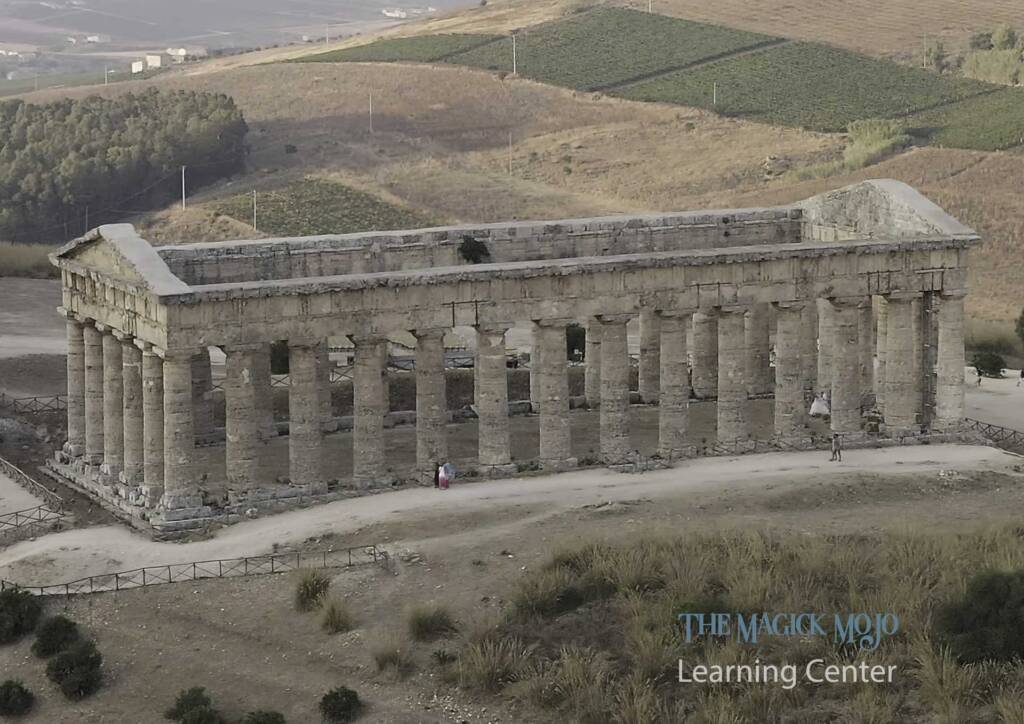
Incorporating figures like Zeus into personal occult practices isn’t without its ethical considerations. As we venture deeper into understanding and potentially practicing ancient religious traditions, it’s crucial to approach the subject with a profound sense of respect and authenticity. Zeus, for instance, is a deity from a civilization with a rich history, and any ritualistic practices involving him should acknowledge this cultural depth. Not doing so can unintentionally belittle the cultural and historical significance of these practices and figures.
Cultural appropriation is a pertinent issue in the contemporary world of occult practices. Simply put, it’s the adoption or borrowing of elements of one culture by members of another culture, particularly when the culture being appropriated has been historically oppressed or marginalized. In the context of Zeus, it means using symbols, rituals, or practices associated with him without proper understanding or respect. Practitioners must strive to avoid such appropriation by ensuring they learn from reliable sources, respect the cultural context and history, and avoid commodifying or misrepresenting the deity and the culture.
Lastly, it’s essential to remember that every individual’s spiritual journey is unique. One must exercise sensitivity when interpreting ancient symbols or engaging in rituals, understanding that these practices have different meanings and significance for different people. By treating the subject of Zeus in modern occult practices with the appropriate level of respect and understanding, we uphold the integrity of these ancient traditions and allow for a more inclusive and ethical practice.
How to Begin Working with Zeus
Embarking on the journey of working with Zeus in your spiritual or occult practices requires both understanding and respect for the deity’s ancient origins. The first step in this journey is an in-depth study of Zeus as a figure in Greek mythology and his various attributes and associations. By gaining a comprehensive understanding of Zeus’s role, you can start to cultivate a meaningful connection with him. It’s crucial during this initial phase not to rush the process; patience and sincerity are key.
Incorporating Zeus into your personal practices often involves creating a dedicated space or altar for him. Traditionally, an altar for Zeus might include representations of his symbols, such as the eagle, the oak tree, or a bolt of lightning. These symbol-laden items can serve as a focal point for your rituals or meditations, helping you channel your intent and establish a stronger connection with the deity. However, remember that the most important aspect of creating an altar is not the physical items themselves but the intent and respect with which you approach them.
Once you’ve established a physical space for Zeus in your practice, it’s time to consider how you will engage with him. You might choose to honor him through prayer, meditation, or offerings. It’s worth noting that the choice of offerings should reflect your understanding of Zeus and his attributes. For example, traditional offerings for Zeus might include wine, incense, or symbols of his divine power, like an oak leaf. Just like the other steps, this should be a personal and heartfelt process, not merely following a prescribed set of rules. Always remember that sincerity and respect should underscore all interactions with Zeus, or indeed any deity you choose to work with.
Further Exploration: Discover More About Zeus
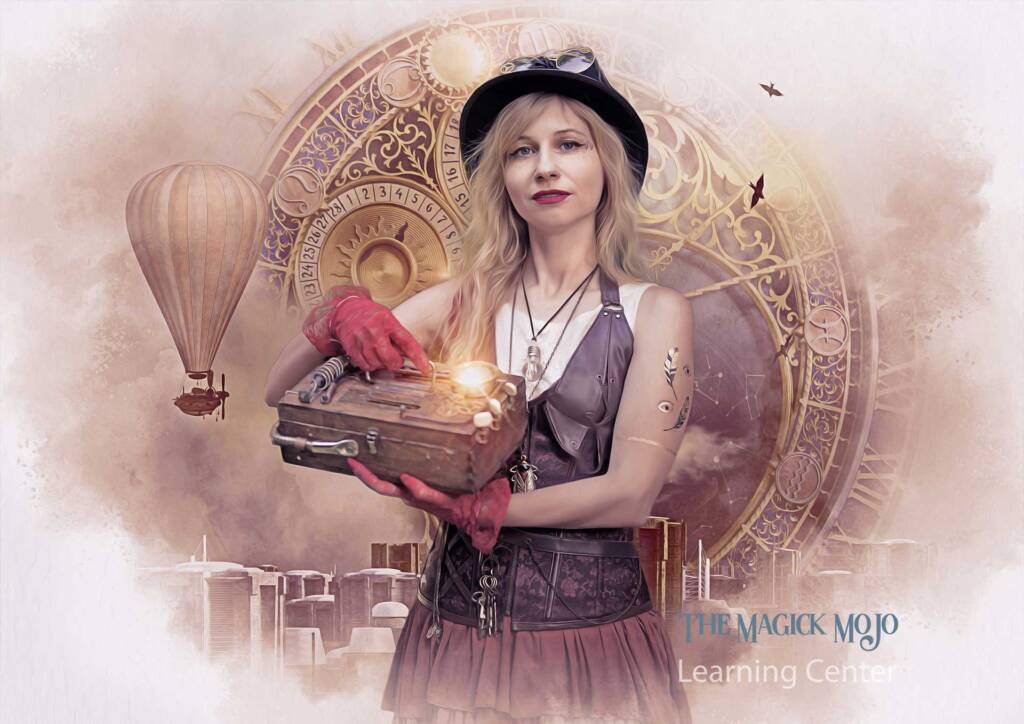
For those eager to deepen their understanding of Zeus and his place in the modern world of the occult, we’ve compiled a list of recommended resources to explore. These references, which include both well-respected books and reputable websites, provide further insight into the complex figure of Zeus, his rich mythology, and how practitioners today incorporate him into their spiritual or occult practices.
Book References
- “The Library of Greek Mythology” by Apollodorus: This classic text is an essential guide to Greek mythology, providing crucial insights into the stories and roles of Greek deities, including Zeus.
- “Zeus: A Journey Through Greece in the Footsteps of a God” by Tom Stone: In this book, the author embarks on a quest across Greece, retracing the steps of the mighty Zeus.
- “Greek Religion” by Walter Burkert: A comprehensive guide to ancient Greek religion, delving into the worship of gods including Zeus, and exploring their cultural significance.
- “Drawing Down the Spirits” by Raven Kaldera: This book provides a modern perspective on the practice of deity possession, which may offer insights for those looking to work with Zeus in their own practice.
- “The Gods of Olympus: A History” by Barbara Graziosi: An engaging look at how Greek deities, Zeus included, have evolved from the ancient world to the modern era.
Website References
- Theoi Greek Mythology: An online encyclopedia exploring Greek mythology and the gods, including a comprehensive section on Zeus.
- Hellenic Gods: An informative website devoted to the practice of Hellenismos, or Greek paganism, offering a wide range of resources on Zeus and other deities.
- Greek Mythology: A website providing detailed accounts of Greek myths, including those involving Zeus.
- The Ancient History Encyclopedia: A non-profit, open-source encyclopedia detailing all aspects of ancient history, including the worship of Greek gods like Zeus.
- The Wild Hunt: A modern Pagan news website that occasionally delves into topics such as working with deities, including Zeus, in contemporary Paganism.
We hope these resources offer fruitful avenues of exploration in your journey to understand Zeus and his role in the modern world of the occult. Remember, knowledge and understanding are crucial elements of any spiritual practice. Happy exploring, and may your journey lead to enlightening discoveries!
JOIN OUR COVEN
Share the Magick
Have the tales and powers of Zeus sparked your curiosity or inspired your own spiritual practices? If you’ve tapped into the thunderous energy of Zeus in your rituals or found unique ways to honor this mighty deity, share your experiences in the comments below. We thrive on the stories and insights of our readers, and each shared experience enriches our collective understanding.
Don’t keep the magic to yourself—help us spread the word by sharing this post on social media. Whether you aim to inspire others with tales of Zeus or provoke thought on the integration of ancient deities into modern practices, every share helps bridge the gap between past and present.
Join us in exploring the enduring legacy of Zeus in the occult world, and let’s continue to unravel the mysteries of the divine together. Your journey, insights, and participation are what make this exploration so enriching.
🌟 Stay Connected 🌟
Are you eager to keep up with the latest spells, magical insights, and celestial events? Subscribe to our newsletter and be the first to receive updates directly in your inbox! “The Magick Mojo Learning Center” is dedicated to helping you enhance your magical practice with curated content and exclusive tips from seasoned practitioners.
By subscribing, you’ll ensure that you never miss out on our newest articles and spell guides. Plus, you’ll get access to special content that’s only available to our subscribers. Join our community of magical enthusiasts today and transform your practice with every update.
We promise to respect your inbox and only send you content that truly adds value to your magical journey. Subscribe now and let “The Magick Mojo Learning Center” be your guide to the magical arts!
